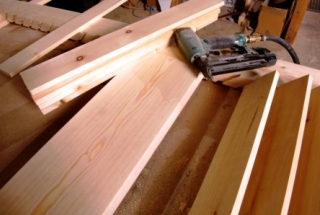Sustainability and Resource Efficiency tools for woodworking companies
Wood is the only naturally renewable mainstream building material, and in recent years, the timber-using industries have made the most of the growing interest in sustainable development to promote their products as the most environmentally friendly choice.
 BWF members are obliged to take their environmental and waste management responsibilities seriously under the BWF Code of Conduct and we encourages our members to use their best endeavours to reduce their environmental impact and to manage resources in an efficient and sustainable way.
BWF members are obliged to take their environmental and waste management responsibilities seriously under the BWF Code of Conduct and we encourages our members to use their best endeavours to reduce their environmental impact and to manage resources in an efficient and sustainable way.
We are working hard on a number of initiatives to ensure that wood continues to be recognised as the most sustainable mainstream construction product. These include industry-wide plans, supported by Government or Government Agencies, which help our members understand the issues, and provide them with management tools to help. We carry out work on timber resource efficiency as part of the Timber Resource Efficiency Partnership (TREP), and are involved in the Windows Sustainability Action Plan.
On this website, you’ll be able to find news and information on the latest industry developments and initiatives from chain-of-custody certification schemes and engineered components for window and door production, to waste management and resource efficiency plans for the joinery industry.
You can find practical guidance and tools such as our E-Learning: Wood Waste & Resource Efficiency Module and Resource Efficiency & Wood Waste Workshops. We also have packages in place to help woodworking businesses achieve ISO14001 and get FSC and PEFC Chain of Custody certification, which will ensure that the products that they supply originate from a legal and sustainable source.
What happens to wood waste now?
The Wood Recyclers Association, formed in 2001, is the main trade association for companies involved in wood recycling in the UK. Its 57 member companies were responsible for recycling 1.8 million of the 2.25 million tonnes total wood waste recycled in the UK in 2010.
The main use of wood waste is in panel board manufacture (1.1 million tonnes), but the use of wood waste for biomass energy increased to over 0.5 million tonnes in 2010 and has increased by over 50% in that last 2 to 3 years.
What is the Windows Sustainability Action Plan?
Formerly known as the Defra Windows Roadmap, this is the result of work undertaken across all material sectors involved in window manufacture, working with Government and other construction colleagues to examine the environmental impacts made by windows. Windows make an important contribution to the energy-efficiency of buildings, but can cause other impacts from the materials that are used in their production, or during maintenance, replacement and at end-of-life.
The Action Plan outlines the challenges faced collectively by the window industry, whether a supplier, manufacturer, distributor, fabricator or installer.
In the case of timber windows, there are a number of areas where best practice methods can be used which will improve our sustainability credentials. Some of these are already undertaken by manufacturers such as those in the TWA Scheme and the Wood Window Alliance. These include the use of certified timber, water based treatments and paints, increased use of engineered timber sections, service life warranties and energy-efficient windows.
You can also learn more about improving process efficiency in your business on our ‘Process Efficiency and Lean Manufacturing‘ page.
